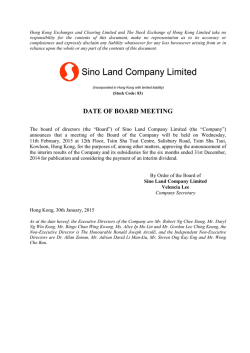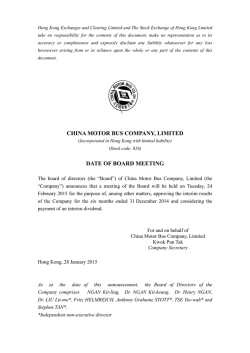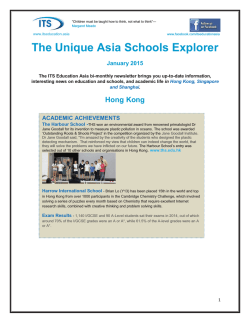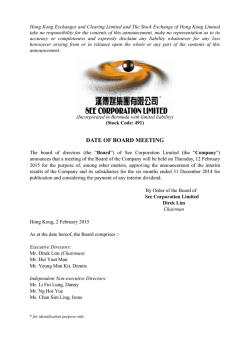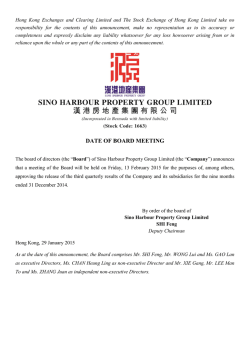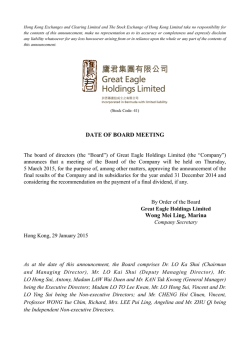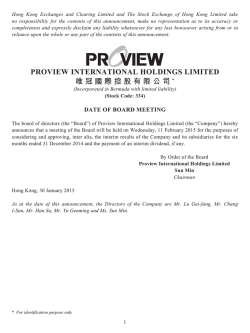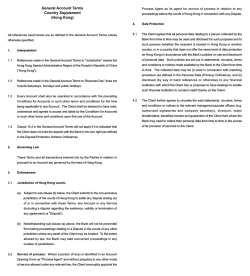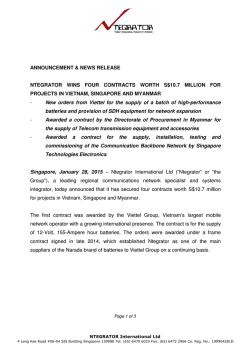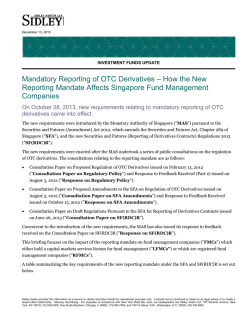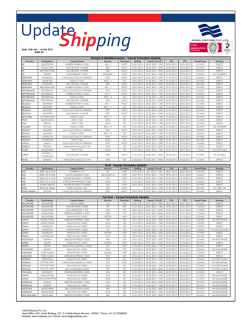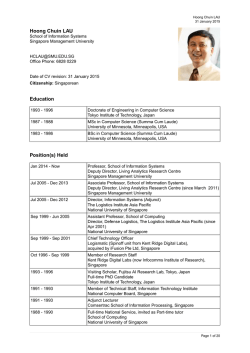
Call for Papers for Signal Processing for Communications Symposium
Call for Papers for Signal Processing for Communications Symposium Scope and Motivation: Signal processing plays a pivotal role in the development of modern communication technologies. Advanced signal processing algorithms are designed and modules are developed to provide innovative solutions to contemporary and emerging communication systems. Considering the diverse and fast-growing nature of research in this field, the Signal Processing for Communications symposium welcomes original contributions in all relevant aspects of signal processing for communications and networking, including design, analysis, implementation, and application. Main Topics of Interest: The issues covered in the Signal Processing for Communications symposium are broad, spanning from traditional transceiver design to state-of-the-art signal processing methodologies in contemporary and emerging communication systems, and application to new frontiers including cognitive radio and smart grid. Our intention is to provide a comprehensive coverage of signal processing methodologies, theories and practices in prevalent and next-generation communication systems and networks. Topics of interest to the Signal Processing for Communications symposium include, but are not limited to: • Channel estimation, equalization Signal detection and synchronization Novel architectures for signal demodulation and decoding Signal processing for single-carrier, OFDM and OFDMA systems Signal processing for spread-spectrum, CDMA, ultra-wideband systems Multi-antenna (SIMO, MISO, MIMO, Massive MIMO) and multi-user systems Distributed, decentralized, and cooperative signal processing in networked systems Compressive sensing algorithms Signal processing techniques for commercial/standardized (LTE, LTE/A, WiMAX etc.) and other emerging systems Waveform design for 5G systems, full-duplex technology • • • • Signal processing for interference cancellation Signal processing for sensor networks Signal processing for software defined and cognitive radio Adaptive antennas and beamforming • • • • • • • • • • • • • • • • • Signal processing for green communications, communications powered by energy harvesters and wireless power transmissions Signal processing for security and cryptography Signal processing for optical communications Signal processing for Nano ( molecular and EM) communications Signal processing for millimeter and Tera-Hz communication systems VLSI/ASIC/FPGA circuits and systems for communications Multimedia (Speech, image and video) signal processing Signal processing for smart grid and powerline communications Localization, positioning and tracking techniques • • Signal processing for big data Machine learning, and stochastic geometry-based signal processing for 5G • Sponsoring Technical Committees: • • Signal Processing & Communications Electronics Wireless Communications How to Submit a Paper: The IEEE Globecom 2015 website provides full instructions on how to submit papers. The desired symposium would have to be selected during submission. The deadline for submission of papers is 1 April 2015. Unlike recent ICC’s and Globecom’s, the deadline will be strictly observed and requests for extensions shall not be entertained. Symposium Co-Chairs: • Himal A. Suraweera, University of Peradeniya, Sri Lanka, [email protected] • Kyung S. Kwak, Inha University, South Korea, [email protected] Biographies: Himal A. Suraweera (IEEE M’07) received the Ph.D. degree from Monash University, Australia in 2007. He is a Senior Lecturer at the Department of Electrical & Electronic Engineering, University of Peradeniya, Sri Lanka. From January 2011 to May 2013, he was a Post-Doctoral Research Associate the Singapore University of Technology and Design, Singapore. From July 2009 to January 2011, he was with the Department of Electrical and Computer Engineering, National University of Singapore, Singapore as a Research Fellow. From February 2007 to June 2009, he worked at Victoria University, Australia as a research fellow. His academic achievements include receiving the University Mollie Holman medal and the Faculty of Engineering Kenneth Hunt medal upon graduating from the Monash University, the IEEE ComSoc AsiaPacific Outstanding Young Researcher Award in 2011 and the WCSP Best Paper Award in 2013. He received an IEEE COMMUNICATIONS LETTERS exemplary reviewer certificate in 2009, two IEEE WIRELESS COMMUNICATIONS LETTERS exemplary reviewer certificates in 2012, 2013 and an IEEE TRANSACTIONS ON VEHICULAR TECHNOLOGY Top Reviewer Award in 2013. Dr. Suraweera currently serves on the Editorial Board of IEEE COMMUNICATIONS LETTERS. His research interests are in the areas of wireless communications, signal processing for communications and communication theory, in particular, relay networks, energy harvesting communications, physical layer security, cognitive radio and MIMO systems. Kyung S. Kwak received his Ph.D from the University of California at San Diego in 1988. He worked with Hughes Network Systems, San Diego, California from 1988 to 1989 and with the IBM Network Analysis Center at Research Triangle Park, North Carolina from 1989 to 1990. Since then, he has been with the School of Information and Communication Engineering, Inha University, Korea as a Professor. He had been the chair of the School of Electrical and Computer Engineering from 1999 to 2000 and the Dean of the Graduate School of Information Technology and Telecommunications from 2001 to 2002 and the Director of UWB Wireless Communications Research Center, a national IT research center, Korea since 2003. In 2006, he served as the President of the Korean Institute of Communication Sciences (KICS), and in 2009, the President of the Korea Institute of Intelligent Transport Systems (KITS). In 1993, he received the Engineering College Achievement Award from Inha University, and a service award from the Institute of Electronics Engineers of Korea (IEEK). In 1996 and 1999 he received distinguished service awards from KICS. He received the LG Paper Award in 1998, and the Motorola Paper Award in 2000. He received Awards of research achievements on UWB radio technology research and development from the Minister of Information & Communication, Prime Minister, and President of Korea in 2005 and 2006, respectively. Also, in 2007, he received the Haedong Paper Award and in 2009, the Haedong Scientific Award of research achievement. In 2008, he was elected as an Inha Fellow Professor (IFP). His research interests include multiple access communication systems, mobile &UWB radio systems, future Internet of Things, and sensor networks. Dr. Kwak is a member of IEEE, IEICE, KICS, KITS and IEEK. TPC Members (Tentative) Tadeusz A. Wysocki, University of Nebraska-Lincoln, USA Shiny Abraham, Tuskegee University, USA Sofiène Affes, INRS, Canada Arafat Al-Dweik, Khalifa University, UAE Osama Amir, KAUST, Saudi Arabia Fulvio Babich, University of Trieste, Italy Kareem Baddour, Communications Research Center, Canada Ebrahim Bedeer, University of British Columbia, Canada Niclas Bjorsell, HÖGSKOLAN I GÄVLE, Sweden Said Boussakta, Newcastle University, UK Danijela Cabric, University of California, Los Angeles, USA Joseph Cavallaro, Rice University, USA Dah-Chung Chang, National Central University, Taiwan Shih Yu Chang, National Tsing Hua University of Taiwan, Taiwan Sheng Chen, University of Southampton, UK Yifan Chen, Newcastle University, UK Wen-Long Chin, National Cheng Kung University, Taiwan A. Chockalingam, Indian Institute of Science, India Jinho Choi, Swansea University, UK Xiaoli Chu, University of Sheffield, UK Pei-Jung Chung, Edinburgh University, UK Kanapathippillai Cumanan, York University, UK Claudio da Silva, Samsung Huaiyu Dai, North Carolina State University, USA Timothy Davidson, McMaster University, Canada Iyad Dayoub, University of Lille Nord de France, France Luca De Vito, University of Sannio, Italy Guido Dietl, University of Applied Sciences Landshut, Germany Octavia Dobre, Memorial University, Canada Maged Elkashlan, Queen Mary, University of London, UK Brian Evans, The University of Texas at Austin, USA Shengli Fu, University of North Texas, USA Kazuhiko Fukawa, Tokyo Institute of Technology, Japan Francois Gagnon, Ecole de Technologie Superieur, Canada Feifei Gao, Tsinghua University, China Monisha Ghosh, Interdigital Kazunori Hayashi, Kyoto University, Japan Yao-Win Peter Hong, National Tsing Hua University, Taiwan Seung-Hoon Hwang, Dongguk University, South Korea Koji Ishibashi, The University of Electro-Communications, Japan Chandra Murthy, Indian Institute of Science, India Koji Ishii, Kagawa University, Japan Tao Jiang, Huazhong University of Sciences and Technology, China Yindi Jing, University of Alberta, Canada Hakan Johansson, Linköping University, Sweden Markku Juntti, University of Oulu, Finland Pooi-Yuen Kam, National University of Singapore, Singapore Sangarapillai Lambotharan, Loughborough University, UK Erik G. Larsson, University of Linkoping, Sweden Yong-Hwan Lee, Seoul National University, South Korea Chih-Peng Li, National Sun Yat-sen University, Taiwan Yonghui Li, University of Sydney, Australia Husheng Li, University of Tennessee, USA Teng Joon Lim, National University of Singapore, Singapore Jia-Chin Lin, National Central University, Taiwan Hai Lin, Osaka University, Japan John Lodge, Communications Research Centre, Canada Collin Ludovic, Universite de Bretagne Occidentale, France Hsi-Pin Ma, National Tsing Hua University, Taiwan Derrick Wing Kwan Ng, Friedrich-Alexander-University, Germany Shaodan Ma, University of Macau, Macau, China Hani Mehrpouyan, California State University Bakersfield, USA Hlaing Minn, University of Texas at Dallas, USA Arumugam Nallanathan, King’s College London, UK Telex Ngatched, Memorial University, Canada Hung Nguyen, The Aerospace Corporation, USA Shuichi Ohno, Hiroshima University, Japan Tomoaki Ohtsuki, Keio University, Japan Menguc Oner, Isik University, Turkey Wing-Kin Ma, The Chinese University of Hong Kong, Hong Kong The-Hanh Pham, Institute of Infocomm Research, Singapore Rostaing Philippe, Universite de Bretagne Occidentale, France Dimitrie Popescu, Old Dominion University, USA Tony Q. S. Quek, Singapore University of Technology and Design, Singapore Emanuel Radoi, University of Brest, France Hideki Ochiai, Yokohama National University, Japan Sergio Rapuano, University of Sannio, Italy Lars K. Rasmussen, Royal Institute of Technology, Sweden Gautier Roland, Universite de Bretagne Occidentale, France Takahiko Saba, Chiba Institute of Technology, Japan Lingyang Song, Peking University, China Chad Spooner, North West Research Associates Rodney A. Kennedy, Australian National University, Australia Risto Wichman, Aalto University, Finland Heidi Steendam, Ghent University, Belgium Zhiguo Ding, Newcastle University, UK Weifeng Su, State University of New York at Buffalo, USA Osamu Takyu, Shinshu University, Japan Tomohiko Taniguchi, Fujitsu Laboratories Ltd, Japan Meixia Tao, Shanghai Jiaotong University, China Chintha Tellambura, Alberta University, Canada John S. Thompson, University of Edinburgh, UK Taneli Riihonen, Aalto University Finland Charalampos Tsimenidis, Newcastle University, UK Stefan Valentin, Bell Labs Chin-Liang Wang, National Tsing Hua University, Taiwan Xianbin Wang, The University of Western Ontario, Canada Fanggang Wang, The Chinese University of Hong Kong, Hong Kong Ian Wells, Swansea Metropolitan University, UK Jamie Evans, Monash University, Australia Caijun Zhong, Zhejiang University, China van Moer Wendi, Vrije Universiteit Brussel, Belgium Kainam Wong, Hong Kong Polytechnic University, Hong Kong Hsiao-Chun Wu, Louisiana State University, USA Jingxian Wu, University of Arkansas, USA Yik-Chung Wu, The University of Hong Kong, Hong Kong Ioannis Krikidis, University of Cyprus, Cyprus Shi Jin, Southeast University, China Minghua Xia, King Abdullah University of Science and Technology, Saudi Arabia Xiang-Gen Xia, University of Delaware, USA Chengwen Xing, Beijing Institute of Technology, China Paolo Banelli, University of Perugia, Italy Zhemin Xu, Broadcom Corporation, USA Nan Yang, Australian National University, Australia Matthew McKay, Hong Kong University of Science and Technology, Hong Kong Jinhong Yuan, University of New South Wales, Australia Chau Yuen, Singapore University of Technology and Design, Australia Yuriy Zakharov, University of York, UK Thomas Zemen, Forschungszentrum Telekommunikation Wien, Austria Gan Zheng, University of Essex, UK Marco Di Renzo, SUPELEC, France Yonghong Zheng, Institute for Infocomm Research, Singapore Li Zhang, University of Leeds, UK Davide Dardari, University of Bologna, Italy Rui Zhang, National University of Singapore, Singapore Yimin Zhang, Villanova University, USA Zhongshan Zhang, University of Science and Technology Beijing, China Yifeng Zhou, Communications Research Center, Canada Andrea Conti, University of Ferrara, Italy Yiqing Zhou, Chinese Academy of Science, China Thushara D. Abhayapala, Australian National University, Australia Xu Zhu, University of Liverpool, UK Weihua Zhuang, University of Waterloo, Canada
© Copyright 2026
